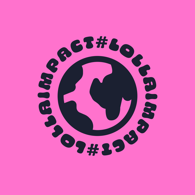Sustainability Certification DIN ISO 20121
Sustainable event management successfully implemented:
Lollapalooza Berlin is the first festival in Germany to receive DIN ISO 20121 certification
Partial certification for the introduction of holistic sustainability management in August 2022 was already considered a harbinger. After the festival was held in September 2022, over a hundred sustainability measures implemented, and a renewed audit performed by the independent auditing body GUTcert, the successful outcome is now official: Lollapalooza Berlin is the first festival in Germany to receive DIN ISO 20121 certification according to international standards. The second part of the certification involved examining and evaluating the conception, planning, management, production and implementation of the festival in more detail. Further audits will take place regularly until 2025, enabling sustainability measures to be continually evolved and adapted to current standards.
In achieving this milestone, the festival has established the foundations for further increases to the sustainability of the entire value chain in future and assumed responsibility for long-term environmentally friendly behaviour. The independent certification of Lollapalooza Berlin proves that the sustainable transformation of music festivals is not only urgently necessary, but actually feasible. It is important to those responsible to involve all stakeholders, from service providers and sponsoring partners to attendees, and thus to create incentives for ecological and socially-minded behaviour.
The certification of Lollapalooza Berlin underpins Live Nation GSA’s extensive commitment to sustainability, which has been evident at all Live Nation GSA festivals for several years.
What did the process look like specifically? Measures and figures:
Specifically, the three main aspects of sustainability were highlighted in the certification process: ecological, economic and social sustainability.
The highest priority was given to evaluating the environmental protection goals that had been set. With regard to greenhouse gas emissions, the mobility patterns of attendees, the electricity supply, the catering service and waste management were scrutinised particularly closely.
For example, the use of disposable plastic was reduced by 90% through a reusable cup system, mandatory sponsoring guidelines and water refilling stations for attendees’ own drinking bottles.
The mobility patterns of attendees were evaluated in cooperation with the Berlin University of Applied Sciences in the form of a scientific study. A total of 4476 people were surveyed by study assistants at the university about their choice of transport and distance travelled. Among other things, the survey showed that the average consumption by festival attendees for travelling to and from the festival was the equivalent of only 9.7 kg CO2. This corresponds to about one third of the average daily CO2 consumption of a person in Germany. Further results of the study will be published shortly.
CO2 emissions in the area of waste management were reduced by 48% in 2022 compared to the 2019 festival. The reduction in residual waste was 50% compared to 2019. This data was collected in cooperation with Berlin Recycling GmbH.
The catering service provided the 2022 audience with a wider choice of vegan and vegetarian dishes. Staff were also able to access daily plant-based options in crew catering. In addition, vegan and vegetarian-only days were introduced for crew catering.
Compared to 2019, a 20% reduction in diesel, e.g. for generator use, was achieved by increasing connections to fixed power. Even though the savings represent progress, the festival organisers see potential for optimisation in this area and are working on a more climate-friendly solution.
Social aspects also continued to be expanded in 2022 as part of the transformation. An awareness team was deployed for the first time, with trained staff working around the clock for attendees. In terms of accessibility, the festival worked with initiatives, and is expanding this aspect further this year.
Lollapalooza Berlin has prioritised the issue of gender equality with its line up. By exclusively featuring FLINTA (a German abbreviation encompassing women, lesbians, intersexual, nonbinary, trans and agender people) on the Newcomer Stage in the Weingarten, Lollapalooza Berlin also ensured up-and-coming FLINTA acts were promoted.
Outlook for 2023
The above measures will be adapted and stepped up for the seventh edition of Lollapalooza Berlin, which takes place on 9 and 10 September 2023.
Specifically, the range of plant-based meals is to be increased and the cooperation with environmentally friendly and socially responsible enterprises and initiatives expanded. This applies, among other things, to sponsoring partners and to the Grüner Kiez, which continues to be a space for political engagement and local associations.
In 2023, logistics will also be put in the spotlight and supplier transport routes examined more closely. Attendees will also be involved in the process with additional measures.
In addition, Lollapalooza Berlin will also present a parity-booked lineup in 2023.
Further information on current measures will be announced via social channels in the coming months.
In its Sustainability Charter, which was launched in 2022, Lollapalooza Berlin has set out its commitments in terms of environmental sustainability, resource efficiency, inclusion, diversity and engagement. The charter is constantly maintained, adapted and expanded: https://www.lollapaloozade.com/charter
Lollapalooza Berlin
9 & 10 September 2023
Olympiastadion & Olympiapark Berlin
www.lollapaloozade.com I Instagram I Facebook I Twitter I #lollaberlin
Press materials & contact: https://medialollapalooza-press.com/
